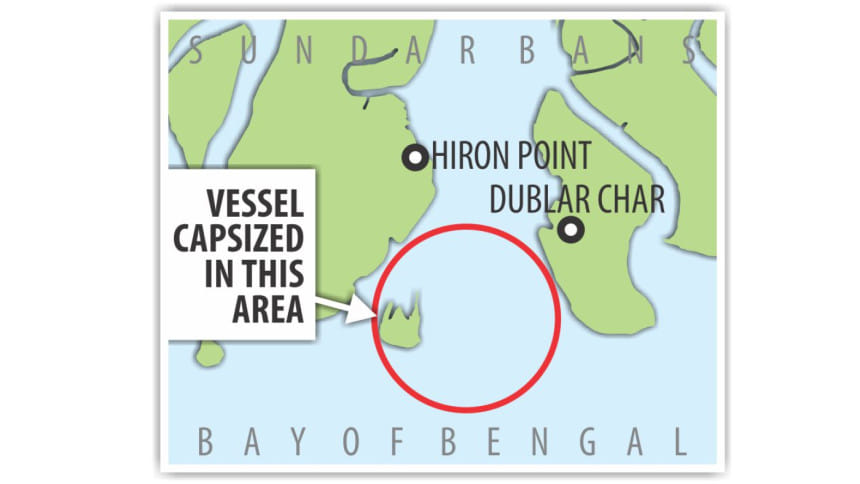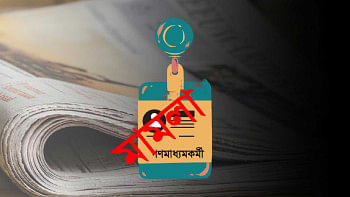Coal danger for Sundarbans

Yet another coal-laden vessel sank near the Sundarbans yesterday morning, a reminder of the danger of transporting coal for the Rampal power plant.
MV Aichgati, a lighterage ship carrying over 1,000 tonnes of coal to Noapara in Jessore, sank in the estuary of the Pasur river and the Bay of Bengal, to the west of Zulfikar channel near Hiron Point in the Chandpai range.
All the crew were rescued by another lighterage vessel passing by at the time of the incident.
Expressing concern, environmentalists said such incidents could be disastrous for the Sundarbans, world's largest mangrove forest, especially for the aquatic life.
Asked whether this coal can harm the forest, Prof Harun ur Rashid of Environmental Science Discipline at Khulna University said this is basically low-quality pit coal brought for brick kilns.
Such low-graded coal contains several types of heavy metals, including sulphur, lead, cadmium, mercury and barium, and many others toxic materials, he said.
"One microgram of mercury can poison 100-litre water. We do not know the quantity of toxic materials in the coal [the ship was carrying]. But certainly it is going to be harmful to the Sundarbans and its species."
Without carrying out a study, nobody can claim that this accident would not be damaging for the Sundarbans. As it is near the “Swatch of No Ground”, the toxic material could reach there during the low tide, he said.
The “Swatch of No Ground”, a submarine canyon in the Bay and known as a hotspot for cetaceans and other aquatic species, has been declared Bangladesh's first “marine protected area”.
It is the fourth vessel to sink in or around the Sundarbans since December 9, 2014 when an oil tanker carrying 3.57 lakh litres of furnace oil sank in the Shela river.
"If the authorities want to transport coal for the operation of Rampal power plant, the way it is being done now, it would be disastrous for the Sundarbans," said Zahir Uddin, conservator of the forest, Khulna division.
Such accidents are happening one after another as the ministry of shipping has been allowing faulty vessels to operate here, he said. If the government does not take necessary measures, the Sundarbans will be always under threat.
As per the environment impact assessment of the Rampal project, mother vessels will bring 80,000 tonnes of coal and offload it at Akram Point off the Sundarbans and later lighterage vessels would bring the coal through the Pasur river to Rampal “controlling” dust.
Every day, the plant will require 10,000 tonnes of coal, which means several vessels will operate along the Pasur through the forest.
Md Waliullah, the harbour master of the Mongla port, said the sinking of MV Aichgati was not causing any trouble for regular operation of vessels through the Zulfikar channel.
"The sea remains choppy where the incident took place. So it is very hard to locate the sunken vessels," he said.
The port authorities had asked the Noapara traders to take necessary steps to spot and salvage the vessel, he added.
MV Aichgati, loaded with coal from mother vessel, sank while crossing the estuary because cracks reportedly developed on its bottom.
Businessman HM Dulal of Mongla port said that Noapara Traders, a business entity from Noapara in Jessore, imported total 48,000 tonnes of coal from South Africa. MV Lady Marry, an Indonesian ship, brought this coal and anchored near buoy 12 at the outer anchorage of Mongla port.
Unloading of coal began two days ago. Loaded with 1,010 tonnes of coal on the MV Aichgati on Thursday night, Aichgati started for Noapara around 8:00am yesterday.
But, he added, it sank around 9:30am because cracks developed in its bottom when it reached near the fairway buoy number seven. Then a vessel carrying fly ash rescued the crew.
Coast Guard (west) Operation Officer Lt Commander Rahatuzzaman told The Daily Star that two patrol teams were dispatched to verify the news around 11:30am.
Previously, three vessels sank in the Sundarbans, drawing criticism and raising alarm over the safety of the world heritage site.
On December 9, 2014, an oil tanker sank and spilt oil spread to the far corners of the forest with the stream of the Shela river. Plants and wildlife were seriously affected.
The government, at that time, was compelled to stop the operation of vessels on the Shela river route.
A vessel carrying fertiliser sank in the Pasur on October 28, 2015 and another with coal in Shela on March 19, 2016.
Professor Anu Muhammad, member secretary of the National Committee for the Protection of Oil, Gas, Mineral Resources, Power and Port, said any sensible government should take this incident as a warning sign.
"Not only the Rampal power plant, the government should stop all sorts of commercial activities in the Sundarbans," he said.

 For all latest news, follow The Daily Star's Google News channel.
For all latest news, follow The Daily Star's Google News channel. 



Comments